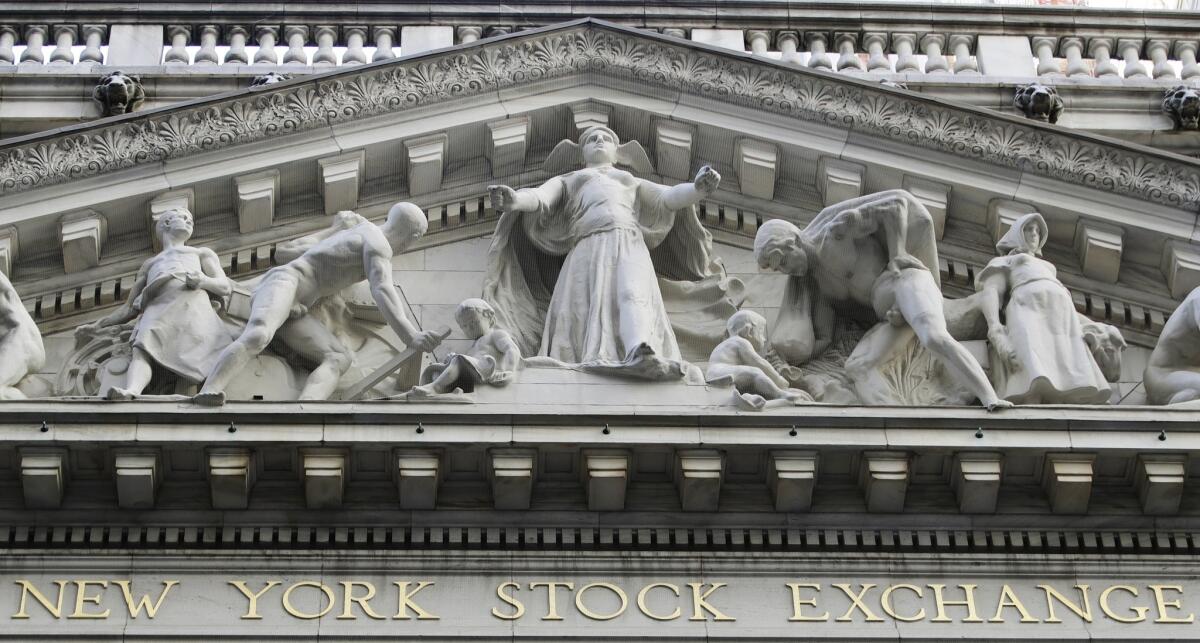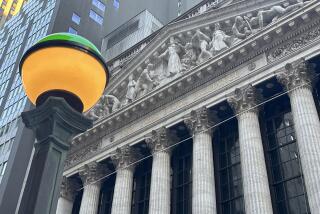Dow approaches 20,000 as energy and tech stocks climb

Major U.S. stock indexes set records again Tuesday as energy companies continued to climb following international deals that will cut oil production. Big-name technology companies such as Apple and IBM also traded higher as the Dow Jones industrial average closed above 19,900 for the first time.
The Dow finished at an all-time high for the seventh consecutive trading day. The biggest gain went to IBM; Apple and Exxon Mobil also finished near the top.
Energy companies rose for the ninth day out of the last 10 as investors anticipated steadier oil prices and larger profits.
Technology companies jumped. They had mostly lagged behind the overall market during its post-election rally but have moved higher in the last few days.
J.J. Kinahan, TD Ameritrade’s chief strategist, said stocks have surged since the presidential election because after a long campaign, investors have a better idea which policies the country will adopt.
“The biggest questions hanging over us are gone,” he said.
The Dow Jones industrial average climbed 114.78 points, or 0.6%, to 19,911.21. Earlier in the day, the blue-chip index was as high as 19,953. The Standard & Poor’s 500 index went up 14.76 points, or 0.7%, to 2,271.72. The Nasdaq composite advanced 51.29 points, or 0.9%, to 5,463.83.
Energy companies rose for the fifth consecutive day. Exxon Mobil climbed 1.8% to $92.58 and Noble Energy jumped 4.5% to $41.64.
OPEC countries agreed Nov. 30 to trim oil production next year, and over the weekend a group of 11 other nations also agreed to make cuts. Those reductions are intended to prop up the price of oil following a two-year slump. U.S. crude is up 17% since the OPEC deal was announced, which has taken it to its highest price in almost a year and a half, and the S&P 500 energy index is up 10%.
Benchmark U.S. crude rose 15 cents to $52.98 a barrel in New York on Tuesday. Brent crude, the international standard, ticked up 3 cents to $55.72 a barrel in London.
Technology companies jumped as a group of tech executives, including the CEOs of Apple and Microsoft, prepare to meet with President-elect Donald Trump on Wednesday. Kinahan said investors in technology companies may be looking forward to tax changes that would encourage them to bring more cash back to the U.S. and invest it in their businesses or return it to shareholders.
On Tuesday, Apple climbed 1.7% to $115.19. IBM was the biggest gainer on the Dow, ticking up 1.7% to $168.29.
Consumer-focused companies rose more than the rest of the market. Online retailer Amazon rose 1.9% to $774.34 and home improvement retailer Home Depot rose 1.5% to $136.54. Newell Brands, which owns brands including Rubbermaid, Elmer’s and Mr. Coffee, ticked up 1.8% to $47.30.
Some companies that have performed very well over the last five weeks lost ground. Basic materials and industrial companies traded slightly lower. Banks, which have soared since the election, rose less than the rest of the market.
Larger companies did much better than smaller ones. The Russell 2000 index of small company stocks, which has soared since the election, was essentially flat.
Japanese brewer Asahi Group said it will pay $7.8 billion to buy five beer brands in Eastern Europe from Anheuser-Busch InBev, the maker of Budweiser. The brands include Pilsner Urquell. In October, AB InBev bought rival SABMiller, and during those negotiations Asahi bought a group of Western European brands including Peroni and Grolsch. AB InBev shares rose 1.3% to $105.05.
Verifone Systems jumped 8.6% to $17.85 after the San Jose company, which makes terminals for electronic payments, gave strong projections for the new fiscal year.
Investors expect the Federal Reserve to raise interest rates when it ends a policy meeting Wednesday. The central bank last raised interest rates a year ago. It has kept rates very low since the 2008 financial crisis, but its leaders have suggested the U.S. economy is improving enough that it is time to start gradually raising rates. Low interest rates have helped drive stock prices higher, but they punish savers who look for income from bank accounts and bonds.
U.S. government bond prices rose slightly. The yield on the 10-year Treasury note slipped to 2.47% from 2.48%, its highest level since June 2015.
The dollar rose to 115.23 yen from 115.12 yen. The euro fell to $1.0622 from $1.0630.
Wholesale gasoline edged up 1 cent to $1.55 a gallon. Heating oil remained at $1.67 a gallon. Natural gas fell 3 cents to $3.47 per 1,000 cubic feet.
Gold fell $6.80 to $1,159 an ounce. Silver fell 21 cents, or 1.2%, to $16.98 an ounce. Copper fell 2 cents to $2.60 a pound.
The FTSE MIB in Italy jumped 2.5%, and UniCredit, the largest Italian lender, soared 16% after it said it will unload $18.8 billion in soured loans, raise billions in cash and cut thousands more jobs.
Germany’s DAX rose 0.8% and the French CAC-40 gained 0.9%. In Britain, the FTSE 100 rose 1.1%. Blue-chip stocks also led the way in Europe.
Tokyo’s Nikkei 225 rose 0.5%. The Kospi in South Korea climbed 0.4% and the Hang Seng of Hong Kong added 0.1%.
ALSO
Donald Trump tweets, and Lockheed Martin stock drops
California to investigate Prudential insurance policies sold through Wells Fargo
I own an Amazon Echo and an Echo Dot, and I still don’t know what they’re good for
UPDATES:
1:45 p.m.: This article was updated with closing prices.
11:20 a.m.: This article was updated with additional context and more recent prices.
8:25 a.m.: This article was updated with prices and context.
This article was originally published at 7 a.m.
More to Read
Inside the business of entertainment
The Wide Shot brings you news, analysis and insights on everything from streaming wars to production — and what it all means for the future.
You may occasionally receive promotional content from the Los Angeles Times.










